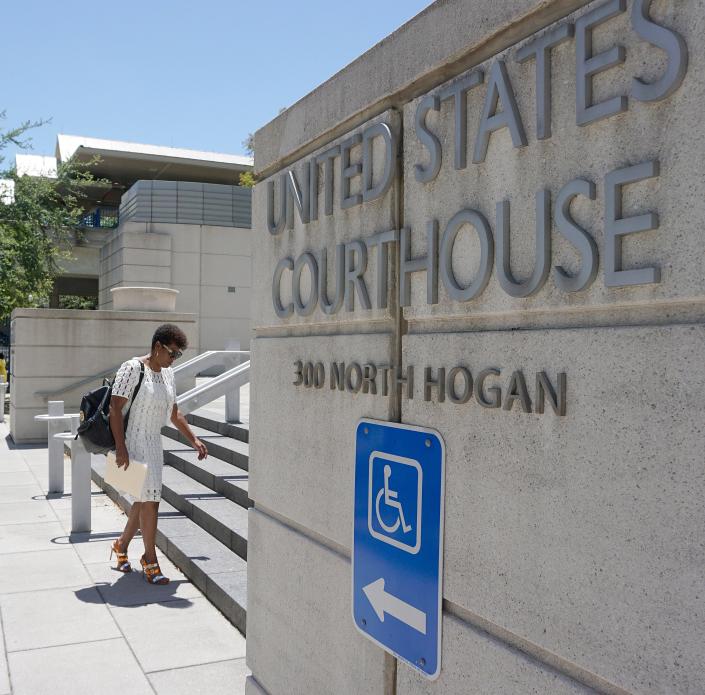Jacksonville Navy hospital worker guilty of part in prescription scam targeting TRICARE

Jurors have convicted a Northeast Florida man of being a bit player in a widely copied prescription scam blamed for bilking up to $2 billion nationwide from the Pentagon’s TRICARE insurance system.
Mario Correa Jackson, 38, could face up to 10 years behind bars after being found guilty of collecting payoff money for recruiting patients and making a payoff to a TRICARE patient, both separate crimes.
He’s one of at least a dozen people who’ve passed through Jacksonville’s federal court in recent years to answer charges involving the scam, where insured patients, usually covered by TRICARE, bring pharmacies prescriptions for expensive but unnecessary compound medicines or creams.

Compound prescriptions, which combine drugs for medicines custom-made for a patient’s condition, soared in cost since the 2000s, consuming a sizable share of TRICARE’s budget despite rarely being used.
Even with efforts to curb costs, “TRICARE's compound coverage is still more generous than most government and commercial health plans,” the federal Military Health System’s website tells visitors.
Jackson, a U.S. Navy member, had a side job recruiting patients for a man who connected people with pharmacies handling expensive compounded creams, prosecutors said in an indictment last year that described prescription payments from 2015.
Working at the time at Naval Hospital Jacksonville, Jackson signed up at least 40 people, targeting military members whose TRICARE coverage sometimes paid tens of thousands of dollars per cream, the U.S. Attorney’s Office said in a release following the verdict last week.

“Once the individuals showed proof of obtaining their prescription cream, Jackson paid them their illegal kickbacks of several hundreds of dollars per cream,” the prosecuting agency said, although his indictment only detailed one $200 payment made to a patient in February 2015.
Jacksonville’s military and retiree population made it a natural hotspot for a TRICARE scam, which prosecutors back in 2016 estimated to have included about $500 million in fraud across Florida.
The indictment said Jackson had been paid $9,000 by a co-defendant, Earl Smalls, who prosecutors charged was paid almost $30,000 by a now-defunct business, Park and King Pharmacy in Riverside.
Smalls and another recruiter, Qualla Miller, took plea deals in 2021 to settle their cases, as did a doctor who Jackson’s indictment said was paid about $100 for each prescription he wrote for compound medication.
The doctor, Felmor Agatep, signed a 2018 plea agreement that said he wrote 268 compound cream prescriptions for TRICARE patients during just two months in 2014 and 2015 after being approached by an unnamed person with a list of patients to phone, but not examine in person.
Agatep soon ended his arrangement with that person, writing letters to each patient and calling each pharmacy to cancel the prescriptions, but the plea agreement said about $4.4 million was billed to TRICARE because of his actions. He pleaded guilty to theft of government property and six months ago Florida revoked his medical license.

The owner of the Park and King Pharmacy, Greg Carter, was indicted with seven other people in 2019 on charges involving conspiracy, kickback payment and engaging in an illegal transaction, but in 2021 jurors found him and a co-defendant not guilty on all counts. Two others were found guilty of conspiring to commit health care fraud, while four other people took plea deals before the case reached the jury.
U.S. District Judge Marcia Morales Howard has scheduled sentencing in October for a series of defendants from the case, but no date has been set yet for Jackson or his two co-defendants.
Although Jackson’s conviction seems to resolve a final part of a complex local web of criminal charges, since 2015 two former employees of Carter have been pursuing a civil suit under the False Claims Act, which allows people to go to court to assert the government has been swindled and seek redress. A new version of the lawsuit, claiming other doctors had corrupt relationships with the pharmacy, was filed in April.
This article originally appeared on Florida Times-Union: Jurors: Navy man guilty of payoff crimes in Jacksonville TRICARE scam

